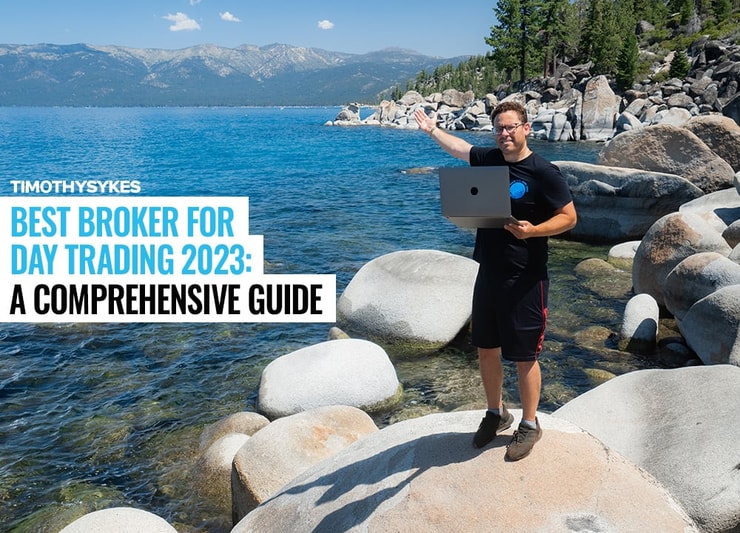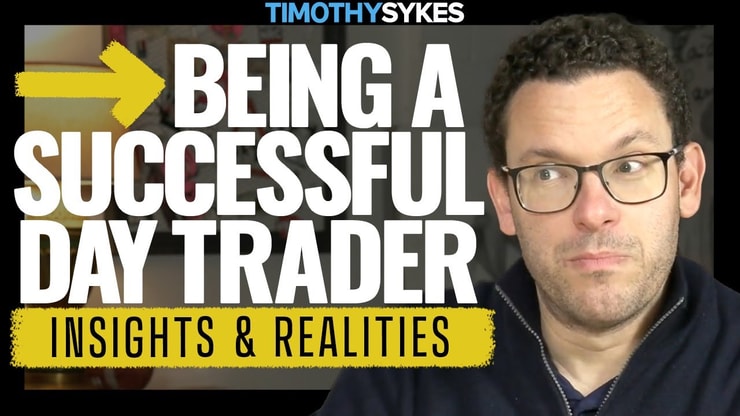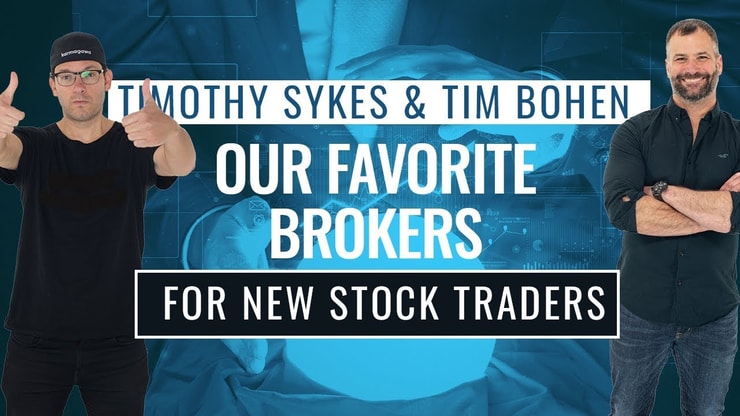Welcome to the fast-paced world of day trading, where every second counts and the right broker can make all the difference. It’s a high-stakes, high-reward environment that demands skill, strategy, and a solid understanding of the market.
Take note: we’re not investors, we’re traders. Active trading is a business that relies on charts and indicators, news watching and watchlist building, to profit off short-term swings of shares.
In this comprehensive guide, we’ll navigate the complex landscape of day trading brokers, helping you find one that fits your trading style and goals. Let’s get started.
Table of Contents
- 1 Understanding Day Trading
- 2 Examining the Components of a Good Day Trading Broker
- 3 Different Types of Brokers for Day Trading
- 4 Exploring Platforms for Day Trading
- 5 How to Choose the Best Day Trading Broker?
- 5.1 Deciding What is Necessary for Your Trading Needs
- 5.2 Comparing Fees on Broker Websites
- 5.3 Conducting Basic Due Diligence
- 5.4 Investigating Further for Added Confidence
- 5.5 Ranking Your Choices
- 5.6 Obtaining a Trial from the Day Trading Broker
- 5.7 Funding Your Trading Account
- 5.8 Continuously Monitoring Your Broker’s Performance
- 6 Reviewing Popular Brokers for Day Trading
- 7 Key Takeaways
Understanding Day Trading

2025 Millionaire Media, LLCDay trading is the high-speed pursuit of buying and selling financial instruments within the same trading day. The goal is to capitalize on short-term price fluctuations in the market. It’s a world where seconds can mean the difference between profit and loss, a world that demands quick decisions, and a world that thrives on volatility.
But why use an online broker for day trading? The answer is access. Brokers are the gatekeepers to the markets where trades happen. They provide the tools, data, and platforms that allow traders to analyze, execute, and monitor trades. Without a broker, a day trader is like a ship without a sail.
What is Day Trading?
Day trading is the practice of buying and selling financial instruments within the same trading day. The goal? To profit from short-term price fluctuations.
Why Use an Online Broker for Day Trading?
Why do day traders need a broker? Simple. Access. Brokers provide the gateway to the markets where trades happen. They offer the tools, data, and platforms that allow traders to analyze, execute, and monitor trades. Without a broker, you’re a ship without a sail.
Examining the Components of a Good Day Trading Broker

2025 Millionaire Media, LLCA good day trading broker is like a Swiss Army knife. It offers a wide range of tradable assets, from stocks and futures to ETFs and options. The more variety, the better. Different markets behave differently, and having access to a broad spectrum of assets gives you more opportunities to profit.
Moreover, a top-notch broker provides a wide range of order types and execution styles. This allows traders to customize their trading strategy and manage risk effectively. From limit orders to stop orders, from ECN to STP, the best brokers give you the tools to trade your way. And let’s not forget about paper trading, a feature that allows you to practice trading with virtual money.
More Breaking News
- Wheels Up Stock Fluctuates Amid Revenue Challenges and Strategic Shifts
- Harmony Gold Acquisition Gains Momentum with Regulatory Green Light
- SMX Stocks Surge: A New Market Paradigm?
- Endeavour Silver Stock Boosted by Analyst Target Upgrades
Variety of Tradable Assets
A good day trading broker offers a wide range of tradable assets. Stocks, commodities, futures, ETFs, options, other investment products – the more variety, the better.
Why? Because different markets behave differently, and having access to a broad spectrum of assets gives you more opportunities to profit.
Wide Range of Order Types and Execution Styles
A top-notch broker provides a wide range of order types and execution styles. This allows traders to customize their trading strategy and manage risk effectively. From limit orders to stop orders, from ECN to STP, the best brokers give you the tools to trade your way.
Paper Trading Feature
Paper trading is a feature that allows you to practice trading with virtual money. It’s a risk-free way to test strategies and get a feel for the market. The best brokers offer this feature, giving you a sandbox to play in before you jump into the deep end.
Different Types of Brokers for Day Trading

2025 Millionaire Media, LLCIn the world of day trading, brokers come in different shapes and sizes. Online brokers, the new kids on the block, offer a modern approach to day trading. They provide a digital platform where traders can execute trades, access market data, and use various tools for analysis.
On the other hand, full-service brokers are the old guard. They provide a comprehensive range of services, including personalized advice, research, and asset management. And then there are discount brokers, the budget-friendly alternatives in the brokerage world. They offer lower fees in exchange for a more bare-bones service.
Online Brokers: A Modern Approach
Online brokers are the new kids on the block, offering a modern approach to day trading. They provide a digital platform where traders can execute trades, access market data, and use various tools for analysis. They’re typically more affordable than their traditional counterparts, making them a popular choice among new traders.
Full-Service Brokers: The Comprehensive Option
Full-service brokers are the old guard. They provide a comprehensive range of services, including personalized advice, research, and asset management. While they come with higher fees, they offer a level of service that can be invaluable for traders who value a hands-on approach.
Discount Brokers: Budget-Friendly Alternatives
Discount brokers are the budget-friendly alternatives in the brokerage world. They offer lower fees in exchange for a more bare-bones service. They’re a good choice for traders who know what they’re doing and don’t need the extra bells and whistles.
Exploring Platforms for Day Trading
When it comes to day trading platforms, traders have a smorgasbord of options. Desktop platforms offer power at your fingertips. They provide robust charting tools, real-time data, and direct market access. They’re designed for serious traders who need advanced features and don’t mind being tied to a desk.
Web-based platforms, on the other hand, offer convenience in the cloud. They allow you to trade from any device with an internet connection. And then there are mobile apps, the pocket-sized powerhouses that let you take your trading on the go.
Desktop Platforms: Power at Your Fingertips
For serious traders who need advanced features and don’t mind being tied to a desk, desktop platforms are the way to go. They offer robust charting tools, real-time data, and direct market access, providing a powerful trading experience. If you’re looking for a comprehensive trading platform, consider exploring some of the best trading platforms for day traders. These platforms are designed to meet the needs of active traders, offering a suite of tools to help you analyze the market and execute trades effectively.
When it comes to trading platforms, StocksToTrade is first on my list. It’s a powerful trading platform that integrates with most major brokers. I helped to design it, which means it has all the trading indicators, Level II quotes, news sources, and stock screening capabilities that traders like me look for in a platform.
I’m not just part of the team — I was one of the first clients!
Grab your 14-day StocksToTrade trial today — it’s only $7!
Web-Based Platforms: Convenience in the Cloud
Web-based platforms offer convenience in the cloud. They allow you to trade from any device with an internet connection, making them a good choice for traders on the go.
While they may not offer as many features as desktop platforms, they provide enough functionality for most traders.
Mobile Apps: Day Trading on the Go
Mobile apps let you take your trading on the go. They provide the core features you need to execute trades, monitor the market, and manage your positions. They’re a must-have for traders who want to stay connected to the market wherever they are.
A good mobile platform should offer a range of support, whether you’re on your iPhone, iPad, or Android.
If you’re interested in mobile trading, check out some of the best stock trading apps available today. These apps offer a range of features to help you stay connected to the market wherever you are.
How to Choose the Best Day Trading Broker?

2025 Millionaire Media, LLCChoosing the right broker is a bit like choosing the right pair of shoes. It’s a personal decision that depends on your individual needs and preferences.
First, you need to decide what’s necessary for your trading needs. Are you a high-volume trader who needs low commissions? Or are you a beginner who needs educational resources? Are you a short selling specialist that cares about finding borrows on the stocks you’re targeting?
Next, compare fees on broker websites. Look at trading commissions, account fees, and any other costs and pricing considerations that might eat into your profits.
Conduct basic due diligence. Check the broker’s regulatory status, read reviews from its current customers, and look for any red flags. And don’t forget to continuously monitor your broker’s performance.
Here’s a quick video on what I look for in a broker:
Deciding What is Necessary for Your Trading Needs
First, you need to decide what’s necessary for your trading needs. Are you a high-volume trader who needs low commissions? Or are you a beginner who needs educational resources? Do you want direct market access (DMA)?
Understanding your needs is the first step in choosing the right broker.
If you’re just starting out, you’ll need a broker that offers robust educational resources, user-friendly platforms, and excellent customer support. In this regard, you might want to consider some of the best stock brokers for beginners. These brokers are designed to help novice traders navigate the complex world of trading, providing the necessary tools and guidance to help you succeed.
Comparing Fees on Broker Websites
Next, compare fees on broker websites. Look at trading commissions, account fees, and any other costs that might eat into your profits.
Remember, the cheapest broker isn’t always the best. You need to balance cost with the services and features you’re getting.
Conducting Basic Due Diligence
Conduct basic due diligence. Check the broker’s regulatory status, read reviews, and look for any red flags. You’re entrusting your money to this company, so it’s essential to ensure they’re legitimate and reputable.
Investigating Further for Added Confidence
Investigate further for added confidence. Look at the broker’s trading platform, customer service, and additional features.
Consider signing up for a demo account to get a feel for the platform and services.
Ranking Your Choices
Rank your choices based on your research. Consider all factors, including fees, platform, customer service, and additional features. Remember, the best broker for you is the one that best fits your individual trading needs and goals.
Obtaining a Trial from the Day Trading Broker
Obtain a trial from the day trading broker. Most brokers offer a demo or paper trading account where you can test their platform and services. This is a great way to get a feel for the broker before committing any real money.
Funding Your Trading Account
Once you’ve made your choice, it’s time to fund your trading account. Be sure to understand the broker’s funding process, including any minimum deposit requirements and funding methods.
Continuously Monitoring Your Broker’s Performance
Finally, continuously monitor your broker’s performance. Keep an eye on their execution speed, platform stability, and customer service. Remember, your relationship with your broker is not a one-time deal. It’s an ongoing partnership that should be evaluated regularly.
Reviewing Popular Brokers for Day Trading

2025 Millionaire Media, LLCWhen it comes to popular brokers for day trading, there are a few names that stand out.
E-Trade
E-Trade offers a user-friendly interface that caters to both beginners and experienced traders, with features such as real-time market data, customizable charts, and a wide range of order types. It also offers a diverse selection of tradable assets, educational resources and research materials, and competitive executions.
eToro
eToro is a social trading platform that allows you to follow and copy the trades of other successful traders. This unique feature, combined with a user-friendly interface and a wide range of tradable assets, makes eToro a popular choice among day traders.
Webull
Webull is a commission-free broker that offers a powerful trading platform with advanced charting tools. It’s a favorite among active traders who appreciate its wide range of tradable assets and technical analysis features.
It’s often compared to Robinhood, but I think it wins on most fronts. Its mobile app is just as user friendly, but it’s more robust. Pairing that with more dependability as a broker makes it a popular choice for day traders.
TD Ameritrade / Charles Schwab
TD Ameritrade is a full-service broker that offers a comprehensive suite of trading tools and resources — it will completely merge with Charles Schwab by the end of year.
Its platform, thinkorswim, is the real draw here — it’s highly regarded for its powerful features and user-friendly interface. TD Ameritrade / Charles Schwab is a solid choice for traders of all experience levels.
Interactive Brokers
Interactive Brokers is known for its direct market access and low commissions. It offers a wide range of tradable assets, making it a good choice for traders looking to diversify their trading activities.
Key Takeaways

2025 Millionaire Media, LLCChoosing the right broker is crucial for your success in day trading. It’s not just about finding the cheapest option, but about finding a broker that offers the right balance of cost, service, and features. Remember, the best broker for you is the one that best fits your individual trading needs and goals.
Trading isn’t rocket science. It’s a skill you build and work on like any other. Trading has changed my life, and I think this way of life should be open to more people…
I’ve built my Trading Challenge to pass on the things I had to learn for myself. It’s the kind of community that I wish I had when I was starting out.
We don’t accept everyone. If you’re up for the challenge — I want to hear from you.
Apply to the Trading Challenge here.
Trading is a battlefield. The more knowledge you have, the better prepared you’ll be.
What broker do you use? Let me know in the comments — I love hearing from my readers!











Leave a reply